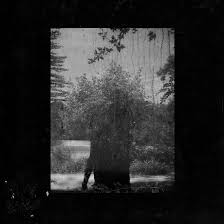The presence of absence permeates Liz Harris’ new album as Grouper, Ruins, to such an extent that it becomes a deeply industrial album. Or post-industrial perhaps, in that the recordings on the album are perambulations around collapsed buildings, rather than the collapsing buildings themselves. Ruins remain a structure – the song titles create an unusual symmetrical acronym – but thwarted structures nonetheless with the luminescent figure of Grouper stealing through this expansive landscape. This expanse is also key as Harris is startlingly skilled at creating sounds which represent empty – or, indeed, ruinous – physical spaces.
Ruins is not necessarily a new album per se, it was entirely recorded while on an artist’s residency in Aljezur, Portugal in 2011 bar the final recording, ‘Made Of Air’, which stems from 2004. Harris confides that when she wasn’t spending her time recording the songs that comprise Ruins, she was "hiking several miles to the beach. The path wound through the ruins of several old estates and a small village. […] I hope that the album bears some resemblance to the place that I was in." In purely nomenclatural terms, the eight songs here reflect these solitary journeys as we encounter clearings, holdings, labyrinths and lighthouses amid signature Grouper tropes of muted piano, extensive reverb and delay and gently unfolding narratives with little recourse to anything resembling excess.
Harris further maintains in the accompanying notes that the recording of this album was the "first time I’ve sat still for a few years". Yet there’s real elegiac–or is it liturgical?–mobility to Ruins, as if she is tentatively exploring simply using these ever-so-stately chords and whispered vocals. This could ensure the listener immediately becomes voyeur, as she wearily avows "Maybe you were right when you said, I’d never been in love, How can I explain why, it’s safer just to be alone?" on ‘Clearing’, but redemption is reached through the blissful empathy of Harris’ voice; resigned, perhaps, but the hushed nature draws us in to listen closer, creating an intimacy through engagement.
Later, on the penultimate album track ‘Holding’, the opening line is a plaintive plea for dissolution: "I hear you calling and I want to go, straight into the valleys of your arms and disappear there." This disappearance is achieved in the instrumental recordings; indeed, the album is bookended with ‘Made Of Metal’ and ‘Made Of Air’, perhaps the only overt nods to Harris’ familiarity with loops and ambient noise and sustained notes. This provides the ruinous orbital within which the album is best experienced.
All of the songs are peppered with incidental noises – meteorological, unidentified clicks and, most strikingly, the undeniably familiar beep of a microwave oven – which brings the affinity, and ultimately familiarity, to an incredible level of intensity. Indeed, Harris deploys silence and sound artfully and masterfully throughout Ruins. And the closer you listen, the more intimate it becomes. Eventually it’s impossible to hear one without the other, hard as you might try.
<div class="fb-comments" data-href="http://thequietus.com/articles/16638-grouper-ruins-review” data-width="550">


